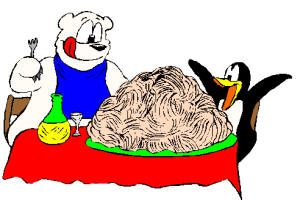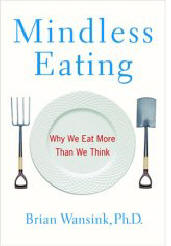Explore Factors That Influence How Much We Eat

Research Discoveries of How Our Environment Influences The Amount We Eat
-
As in the picture above, when we are served larger portions, we tend to eat more!
-
If you can see the food, and if the food is close to you, you'll probably eat more! There is truth to the old adage, out of sight, out of mind!
-
Having a great variety of foods that are randomly arranged makes us want to eat more. Think of a potluck that you attended recently. So much food, so little time!
-
Eating from a LARGE bag or box of something. Have you ever noticed that when you eat from the whole bag of potato chips or other snacks that it's easy to get "hand-to-mouth dis-ease" and end up eating way too much?
How to Get Control of Portion Sizes
-
Keeping a food journal can shed light on how much and what you eat and you'll discover the factors that influence your food choices.
-
Pause for your cause! Whenever you feel an urge to eat, check in to see what you are hungering for. Is it emotional, soul nurturing, or food?
-
Set up your home, work, and travel environment to support your success.
-
Eating regular meals and snacks can keep you from getting over hungry.
-
Weigh and measure foods at home so that you get used to how a "portion" looks. It is helpful to use measuring cups as portioning tools to serve yourself. Also, you can get 1-cup or 2-cup plastic storage bowls to serve yourself. I do this at home with my yogurt and fruit. I take a 2-cup bowl, fill it half-way with yogurt, and put in flavorings and sweetener, I then fill it up with frozen blueberries until the 2-cup mark. That makes "food portioning" very easy to do. Most people underestimate what they have eaten by about 25 - 30%! You might think, "Oh, I'm just eating like a bird!" Watch out! You may be eating like an ostrich, not a robin!
-
Practicing eating slowly and with awareness will help you eat less.
-
Pay attention to levels of hunger and fullness and STOP eating just when you feel satisfied. It's NOT your last meal, you will be able to eat again!
-
Eating veggies or salads first when you sit down for a meal will help fill up your stomach and you will eat less. I also do this when I'm having a late dinner with friends. I usually eat around 5:30 pm and if I wait until 7 or 7:30 pm, I'll overeat. So I have a small snack (like some raw veggies or fruit) to tide me over so I don't overeat.
-
I don't eat from a "whole container" of anything. I always take a single portion out and then put the other away. For me, I LOVE salted peanuts. I keep them in the basement because I find it TOO easy to just grab handfuls of them if they're in the kitchen, so I take a single portion (to mix with raisins) upstairs and leave the can downstairs! Then if I want another portion, I have to go downstairs to get it! This technique stops mindless eating.
-
Check out food labels to see the "reference amount" that is listed, serve yourself a "usual portion," and then double-checking to see how many "servings" you are having.
-
Drinking adequate amounts of fluids can help you eat less. We may sometimes confuse signals of being thirsty with hunger and find ourselves eating food when what we really need is water!
|
Intuitive Eating by Evelyn Tribole M.S. , R.D. and Elyse Resch M.S., R.D. is an excellent resource on honoring your hunger, enjoying the pleasures of food and feeling your fullness. To explore her 10 Principles of Intuitive Eating and her website. |
Check out this really excellent book at: http://www.mindlesseating.org/ You'll discover many surprising facts about why you make the food choices that you do and how to make gradual changes that help you eat less.
